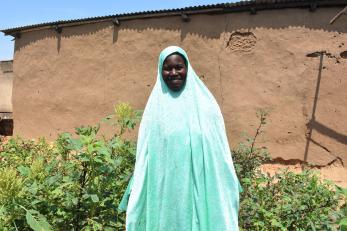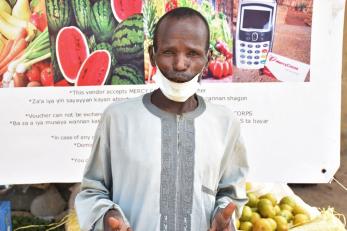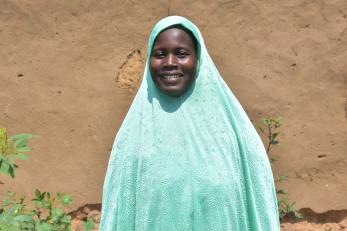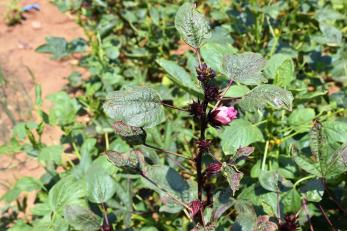Addressing food insecurity through urgent food assistance and kitchen gardening

Delivering urgent food assistance
Access to healthy nutritious food is always a problem in crisis regions. In Borno state, northeast Nigeria, the food security in most of the local government areas is very low due to the sustained actions of armed groups in the regions. Families in towns like Bama and Damboa were forced to abandon their means of livelihood thereby limiting their capacity to make a living and provide the necessary food they needed. Desperate to survive, some of the families in these two towns were forced to resort to odd means to make ends meet.
Succor came in the form of the food assistance implementation of the Addressing Diverse and Acute Primary Threats (ADAPT) To Human Security in Northeastern Nigeria program. Some selected participants of the program were provided with an e-voucher with which they can redeem food items weekly. The selection was done based on the level of severity and the household’s propensity to acute food insecurity.

Mohammed Umar, in his late sixties, who was a farmer before his community was outrun by Insurgents in 2014, had struggled to cater to the needs of his family since his return in 2018. His farmland is currently inaccessible due to its proximity to insurgent routes. He was selected as a food assistance participant on the Mercy Corps’ ADAPT program and has since been receiving food assistance from the program’s enrolled vendors in Bama. Getting his redeemable voucher was a breath of fresh air for him and his 14 dependents.
“With this Mercy Corps’ card, I can collect meat, fruits, and vegetables this week and next week I will be able to collect maize, rice, spaghetti, yam and even seasoning cubes”, he tells us.
“After we returned to Damboa we couldn’t find any meaningful thing to do to earn a regular income, the insurgency had taken all we had and left us with nothing. As a man I couldn’t take care of my family”, said Hassan Kaigama, another participant.
Meeting and sustaining nutrition needs through kitchen gardening
The promotion of subsistent vegetable production through backyard kitchen gardens using the permagarden technique on the ADAPT program has yielded a lot of successes.
Participants across Damboa local government area (LGA), Borno state are currently harvesting their produce. Falmata Muhammed and her family have been able to grow their kitchen garden into a viable source of vegetables for their meals. This is changing their dietary composition and ensuring they have adequate nutrients needed for a balanced diet.

Prior to the initiative, households like Falmata’s would have to spend more out of their meager resources to achieve the necessary dietary composition for their meals. The effects of the insurgency in the area, which is predominantly a farming community, have limited the accessibility to arable lands for farming, thereby limiting the ability of households to make adequate income. Therefore, basic foodstuffs like vegetables became a luxury.

Upon the inception of the ADAPT program, a subset of the participants from the food assistance component of the program was selected to participate in the kitchen gardening initiative. They were provided with seeds and trained on how to monitor the growth of the vegetables.
“We were given seeds for onions, carrots, lettuces, sorrel, and amaranthus, which we planted in prepared spaces within our compounds,” Falmata said.
Participants have since begun harvesting the vegetables and replanting new seeds sourced from their own farms. Some of the participants with larger gardening spaces have been able to support their neighbors with vegetable gifts while some of the excesses are sold in the local markets.
On the family front, some women have been able to regain some level of increasing financial control within the family. Evening out the gender power dynamics in the home.
“When I harvested my first amaranthus and used it to make a meal for my family, my husband was surprised and started loving me more and his respect for me increased,” said Falmata.
With the extra funds made from the sale of her garden vegetables, Falmata is able to support her husband with their children's school fees and materials. One of her fun activities to look forward to is helping her kids with their homework.
Mercy Corps team members, village agents and extension officers in Borno state are engaged in sustained sensitization of the participants to ensure adoption of progressive farming methods.
About ADAPT Program
Addressing Diverse and Acute Primary Threats (ADAPT) to Human Security in Northeastern Nigeria is funded by USAID's Bureau for Humanitarian Assistance (BHA) with the goal to save lives and prevent human suffering among displaced, returnees and host households in Borno State. The goal aligns with BHA’s principal mission statement to “save lives, alleviate human suffering, and reduce the physical, social, and economic impact of rapid and slow-onset disasters”. The scope of the program supports the Humanitarian Response strategy for Nigeria 2019 – 2021 to achieve these key strategic objectives through a multi-sectoral humanitarian response.